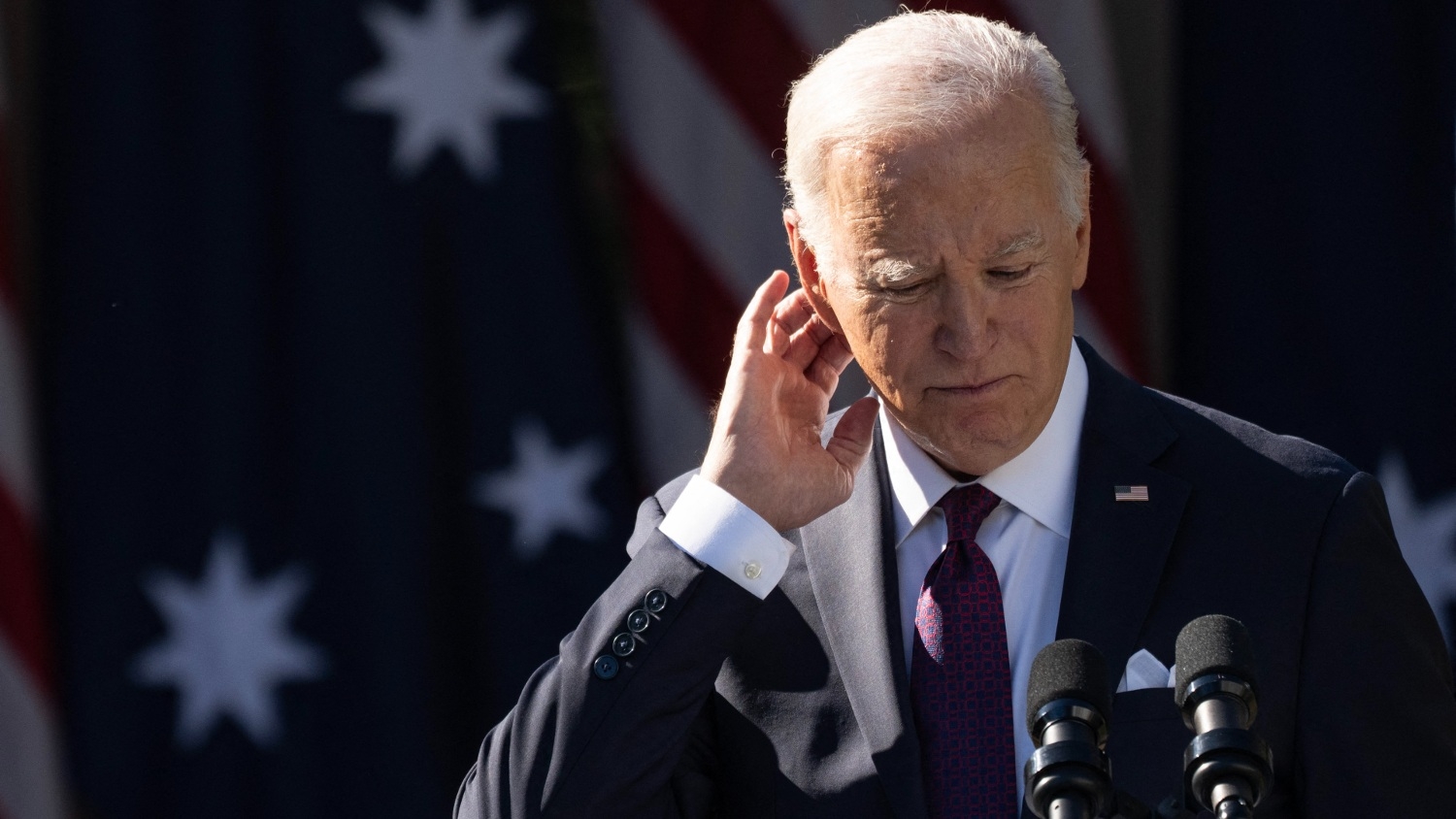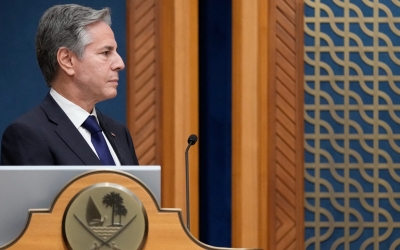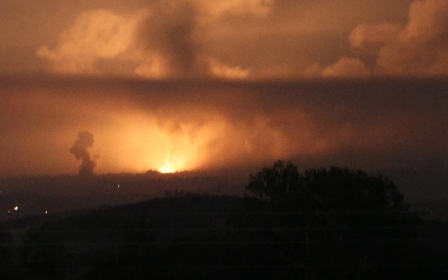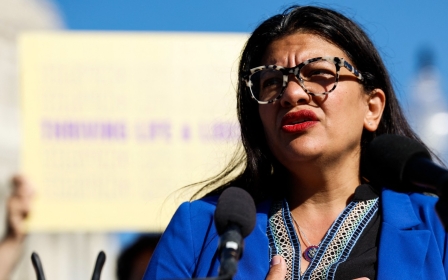Israel-Palestine war: Biden administration refused to meet Muslim Americans publicly critical of Gaza policy

US President Joe Biden refused to include Muslim Americans who have been publicly critical of the administration's position on the Israel-Palestine war as part of the administration's outreach to Arab and Muslim American advocates, sources told Middle East Eye.
According to a source in the State Department, hours before a meeting between Biden and a group of Muslim Americans, several activists had urged a group of advocates to boycott the meeting to make it clear that the Muslim community was not going to accept the administration’s excuses for its unflinching support of what experts are saying is a genocide of Palestinians.
“There was no purpose for this meeting,” the source, who asked to remain anonymous, told MEE.
“The Biden Administration also refused to speak to anyone that publicly disagreed or criticised them,” the source said.
According to the Wall Street Journal, the group that met Biden included Minnesota Attorney General Keith Ellison; Wa’el Alzayat, of the Muslim political advocacy group Emgage; Imam Mohamed Magid, executive religious director of All Dulles Area Muslim Society Center in Virginia; Rami Nashashibi, a Palestinian-American and director of the Inner-City Muslim Action Network; and Suzanne Barakat, a professor of family medicine at the University of California.
New MEE newsletter: Jerusalem Dispatch
Sign up to get the latest insights and analysis on Israel-Palestine, alongside Turkey Unpacked and other MEE newsletters
"Also, if the Biden Administration refused to meet with anyone that disagreed with them publicly or criticised their policies, these five should have declined on the basis of not supporting censorship or suppressing democracy,” said the source in the State Department.
MEE reached out to the five individuals present at the meeting for comment, but aside from Rami Nashashibi, did not receive a reply by the time of publication. MEE also reached out to the White House for comment, but did not receive a response.
Nashashibi told MEE that there were discussions with a section of the community over whether to attend the meeting with Biden or not. He said he had personal reservations, too, but ultimately decided to meet with Biden.
He, however, denied that there were any demands for boycotting the meeting.
Several sources familiar with consultations between government officials and Arab and Muslim Americans over the past week told Middle East Eye that not only did the Biden administration fail to reassure Palestinians that they had any intention of halting the devastating loss of life in Gaza, but it didn’t appear to be in a rush to provide a roadmap for ending hostilities.
The lacklustre response from the Biden administration and its opaque engagement has prompted a wave of discontent among Palestinian Americans, as well as among the larger Arab and Muslim community, as they struggle to reconcile that their tax dollars are supporting a campaign of murder and carnage in Gaza.
Though groups of Muslim Americans met Secretary of State Antony Blinken on Tuesday and President Joe Biden on Thursday to hear their discomfort over Washington's stance, they say the administration seemed focused on constructing an image of concern rather than taking action.
“While Blinken appeared empathetic to our concerns, that means very little to me at a time when innocent lives are literally at stake,” a source familiar with the meeting with Blinken on Tuesday told MEE.
“We need action, not words. We don’t need more aid right now, we need Israel to stop killing and blockading Palestinians, we need an end to US complicity in allowing Israel to do so, and most importantly we need accountability, especially at a time when Biden himself denied Palestinian deaths and shrugged them off as the 'cost of war',” the source said.
Since the bombardment of Gaza began on 7 October, Israeli air strikes have killed more than 7,300 Palestinians, including nearly 3,000 children and around 2,000 women, according to the Palestinian ministry of health. The number of killed and missing in Gaza has now reached the toll from the Srebrenica genocide.
Opaque engagement
The devastating loss of life and the Biden administration's sweeping endorsement of Israel's need for a befitting reply to the attack by Palestinian fighters on 7 October, in which 1,400 Israelis were killed, has incensed Muslim and Arab communities, prompting concerns of a possible electoral crisis for Biden next year.
Though Muslim Americans make up just one percent of the total US population, they are seen as crucial voting blocs in certain swing states like Michigan.
Biden's Thursday meeting arranged by the White House was scheduled to purportedly address rising Islamophobia and anti-Muslim racism in the US on account of the events of the past three weeks.
A source familiar with the dialogue said that participants used the opportunity to speak specifically with Biden about Israel’s brutality in Gaza, rising anti-Palestinian sentiment, as well as the president’s comments over the week that cast doubts over the number of Palestinians killed by Israeli airstrikes. Biden also previously said he had seen photos of beheaded babies, a remark the White House walked back on a day later.
Rami Nashashibi, the sole Palestinian American invited to the meeting, said he advocated for a ceasefire, and also spoke about how the president had used dehumanising language for the Muslim and Palestinian communities. Biden has so far refused to support or call for a ceasefire.

"As the only Palestinian, I felt a profound weight on my shoulders to be explicit about how that was a problem, number one, and that there are a dynamic range of Palestinian American voices that need to be heard in this moment," Rami Nashashibi told Middle East Eye.
Following the meeting on Thursday, select members of the cohort who had met with Biden held a "debrief" over Zoom with the wider Muslim American activist community.
On this call, MEE understands that a number of Muslim American activists raised concerns over the credibility of the group that attended the meeting with Biden, with some asking why the cohort hadn't demanded more representation of Palestinian voices at the meeting before accepting the invite.
Others in the "debrief" argued the cohort should have boycotted the meeting to send a message to the administration.
Activists and observers said the lack of transparency and the seemingly careful curation of specific participants raises concerns about Biden's commitment to sincerely engaging with the realities faced by Palestinians.
"The narrow selection of individuals to represent Palestinian and pro-Palestinian voices does not adequately represent the broader Palestinian and pro-Palestinian movement and community," Ayah Ziyadeh, outreach director for Americans for Justice in Palestine Action, told MEE.
"It gives the impression that the administration is only putting on a facade of engagement while failing to address the broader concerns of the Palestinian and pro-Palestinian community and the root cause of the current issue: Israel's clear intent to completely ethnically cleanse Palestinians," she said.
The State Department has been in turmoil over the past two weeks with several diplomats either drafting or signing dissent cables to signal their objection to America's unflinching support for Israel. With Biden signalling that a ceasefire was off the table, the source said that by attending a meeting with the president, the group had "signalled to the Biden Administration that the ceasefire was up for discussion".
Middle East Eye delivers independent and unrivalled coverage and analysis of the Middle East, North Africa and beyond. To learn more about republishing this content and the associated fees, please fill out this form. More about MEE can be found here.




